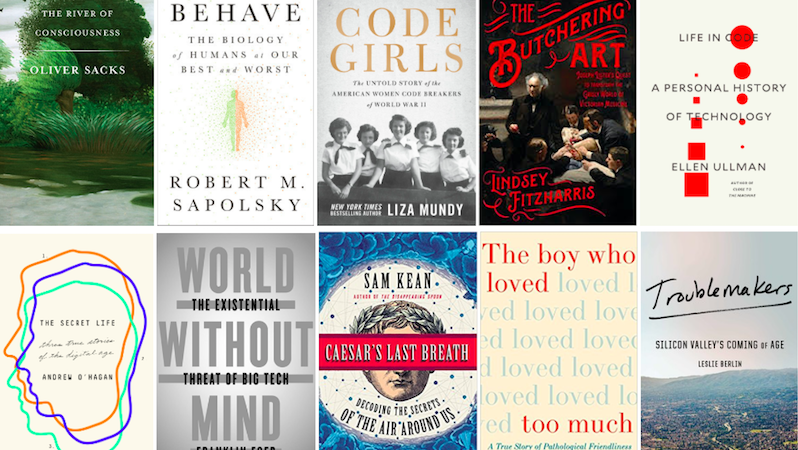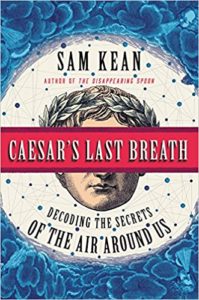
Science & Technology
1. The River of Consciousness by Oliver Sacks
(8 Rave, 3 Positive)
“… the reader is in thrall to Sacks’ ability to braid wide reading, research and experience with his neurology patients to reach original and subtle conclusions … We are gently shepherded through Darwin’s obsession with the deeper meaning of plant lives (Darwin and Sacks, with their expansive abilities to look deeply into small matters and uncover, with evident delight, large truths, seem like brothers separated by a mere century) … Sacks himself is the expression of just this mental agility, a mind at play in the world, capable of profound insights into the pain of his patients.”
–Jenni Laidman (The Chicago Tribune)
*
2. Behave: The Biology of Humans at Our Best and Worst by Robert M. Sapolsky
(6 Rave, 1 Positive)
“Sapolsky has produced a quirky, opinionated and magisterial synthesis of psychology and neurobiology that integrates this complex subject more accessibly and completely than ever … Behavioral biology is indeed complex, but Sapolsky simplifies the topic with a beautifully organized and well-stocked store of knowledge. He has such a light tone, so imperious a command of data and such a rich fund of anecdotes that we are swept swiftly along to the last third of the book.”
–Richard Wrangham (The New York Times Book Review)
*
3. Code Girls by Liza Mundy
(5 Rave, 3 Positive)
“We owe Mundy gratitude for rescuing these hidden figures from obscurity. Even more valuable is her challenge to the myth of the eccentric, inspired, solitary male genius, like Alan Turing. As Mundy demonstrates, code-breaking in World War II ‘was a gigantic team effort,’ and ‘genius itself is often a collective phenomenon.’ Codes were broken by the patient labor of groups of people ‘trading pieces of things they have learned and noticed and collected.’ I suspect there are more stories of hidden figures waiting to be told. But in writing this book, Mundy has broken some of the codes that kept them hidden for so long.”
–Elaine Showalter (The Washington Post)
*
4. The Butchering Art by Lindsey Fitzharris
(4 Rave, 3 Positive)
“…her biography of Lister restores this neglected champion of evidence-based medicine to a central place in the history of medicine …a formidable achievement — a rousing tale told with brio, featuring a real-life hero worthy of the ages and jolts of Victorian horror to rival the most lurid moments of Wilkie Collins.”
–John J. Ross (The Wall Street Journal)
*
5. Life in Code: A Personal History of Technology by Ellen Ullman
(2 Rave, 6 Positive)
“Life in Code is a consummate insider’s take, rich with local color and anecdotes … Ullman has a pure passion for computing that doesn’t stop her from recognizing all the ways it can isolate and intimidate — or how unconscious bias works like a sort of snow blindness on the striving (and yes, still overwhelmingly white and male) dreamers who would call themselves disrupters. Like all great writers, she finds the universal in the specific, mixing memoir with industry gossip (cameos by Google cofounders Sergey Brin and Larry Page, a wry Microsoft dig) and ancillary tales of house cats, dairy farmers, and Julia Child. Code is illuminating and unfailingly clever, but above all it’s a deeply human book: urgent, eloquent, and heartfelt.”
–Leah Greenblatt (Entertainment Weekly)
*
6. The Secret Life: Three Stories of the Digital Age by Andrew O’Hagan
(4 Rave, 2 Positive)
“Andrew O’Hagan explores these themes with great depth and originality … Squeezed between two compelling character studies is a relatively short essay entitled ‘The Invention of Ronald Pinn.’ This Nabokovian-sounding figure is a dead man of around O’Hagan’s age whom the author reanimates online, creating a series of supporting fake identities on social media. It’s a strange, slightly haunting voyage into digital life that reads as much like a short story as an essay. It ends with O’Hagan encountering the dead man’s mother. And suddenly, at the core of this excellent collection, we glimpse the unbridgeable difference between the real and the invented.”
–Andrew Anthony (The Guardian)
Read an excerpt from The Secret Life here
*
7. World Without Mind: The Existential Threat of Big Tech by Franklin Foer
(1 Rave, 7 Positive)
“Readers who loved Dave Eggers’ dystopian novel, The Circle, will recognize similarities in what Foer explores here. The difference is that Foer is warning America that the growing nightmare is real, and that it’s happening in ways few are cognizant of. This is a splash of ice-cold water, a fierce call to action, and a great read.”
–Frank Tempone (Booklist)
Read an excerpt from World Without Mind here
*

8. Caesar’s Last Breath: Decoding the Secrets of the Air Around Us by Sam Kean
(2 Rave, 5 Positive)
“..by the end of this delightful, deeply researched exploration, Kean’s assertions will seem justified — the book brims with such fascinating tales of chemical history that it’ll change the very way you think about breathing … Kean crams the book full of wild yarns told with humorously dramatic flair … There are vignettes sandwiched between chapters; even the endnotes are a revelation. The effect is oddly intimate, the way all good storytelling is — you feel like you’re sharing moments of geeky amusement with a particularly hip chemistry teacher.”
–Chelsea Liu (The San Francisco Chronicle)
*
9. The Boy Who Loved Too Much by Jennifer Latson
(3 Rave, 3 Positive)
“The narrative is alternately moving and heartbreaking, as Latson walks readers through the tumultuous obstacles that Eli and Gayle face daily. Throughout, Latson demonstrates a sharp, journalistic eye for telling detail and the ability to capture poignant moments without resorting to cliché or overly sappy writing … Refreshingly, Latson does not sugarcoat Gayle’s very real mental and emotional battles as she tries to make her son’s life as fulfilling as possible, and readers will be hard pressed not to empathize with Gayle’s attendant fight to maintain some sense of self …In this balanced, readable work, Latson effectively and sympathetically captures Eli’s essential humanity and opens a clear window on a little-understood genetic disorder.”
–Eric Liebetrau (The Boston Globe)
*
10. Troublemakers: Silicon Valley’s Coming of Age by Leslie Berlin
(1 Rave, 6 Positive, 1 Mixed)
“Berlin rightfully illustrates the nationwide alarm that resulted from the advent of a process that gave people editing power over human life … Berlin is a historian, not an editorialist, and her charge is to deliver the narrative, a task that she does with great style and storytelling skill …relies on a trove of unpublished primary sources, including interviews, that few would be able to synthesize so deftly. It is not too difficult to envision a sequel of sorts.”
–Jackson Holahan (The Christian Science Monitor)

